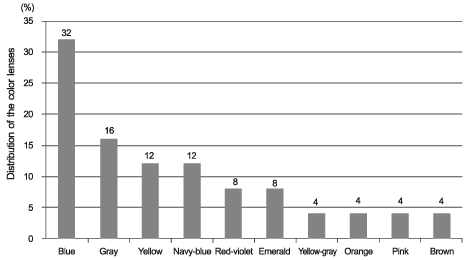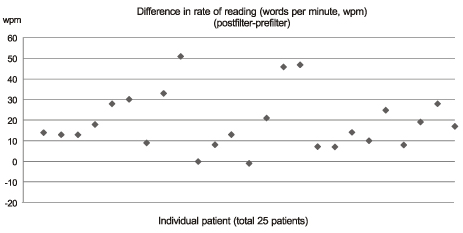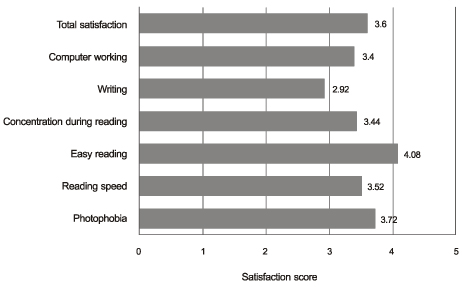J Korean Ophthalmol Soc.
2012 Mar;53(3):452-459.
The Effect of Colored Filters in Patients with Meares-Irlen Syndrome
- Affiliations
-
- 1Department of Ophthalmology and Visual Science, The Catholic University of Korea College of Medicine, Seoul, Korea. ckjoo@catholic.ac.kr
- 2Department of Ophthalmology, Korea University College of Medicine, Seoul, Korea.
Abstract
- PURPOSE
To evaluate the benefit of colored filters in Meares-Irlen Syndrome patients with reading difficulties.
METHODS
Twenty-five patients were selected through a brief questionnaire aimed to determine symptoms of eyestrain or visual distortion after thorough eye examinations. The cutoff value of the questionnaire was 2.13. The rates of Korean reading and writing were measured using the RWSM (Reading Writing Speed Meter) test with and without the use of colored filters. Two months after wearing the individually prescribed colored filters, a questionnaire on the patient's subjective satisfaction with the colored filters were completed and evaluated.
RESULTS
The blue (n = 8, 32%) and gray (n = 4, 16%) colors were the most frequently selected filters. The mean score of the questionnaire on reading difficulties was 2.72. The mean reading rate improved from 82.72 wpm (words per minute) to 101.84 wpm with the colored filters, a statistically significant change (p = 0.019). The mean writing rate did not improve. The overall satisfaction score with the colored lenses was 3.6, with the highest score given to ease of reading (4.08) and the lowest to writing (2.92).
CONCLUSIONS
In cases of reading difficulty, colored filters were effective for alleviating visual symptoms and improving reading speed. It is important to achieve an adequate understanding of the specific symptoms of Meares-Irlen Syndrome and to perform a thorough eye examination to differentiate this from other ocular disorders.
Figure
Reference
-
1. Nandakumar K, Leat SJ. Dyslexia: a review of two theories. Clin Exp Optom. 2008. 91:333–340.2. Irlen H, Lass MJ. Improving reading problems due to symptoms of scotopic sensitivity syndrome using Irlen lenses and overlays. Education. 1989. 30:413–417.3. Meares O. Figure/ground, brightness contrast, and reading disabilities. Visible language. 1980. 14:13–29.4. Irlen H. Reading problems and Irlen coloured lenses. Dyslexia Rev. 1997. 8:4–7.5. Kim SH, Cho YA. Clinical characteristics of patients with dyslexia in Korea : correlation with Meares-Irlen syndrome. J Korean Ophthalmol Soc. 2010. 51:1639–1642.6. Demb JB, Boynton GM, Best M, Heeger DJ. Psychophysical evidence for a magnocellular pathway deficit in dyslexia. Vision Res. 1998. 38:1555–1559.7. Livingstone MS, Rosen GD, Drislane FW, Galaburda AM. Physiological and anatomical evidence for a magnocellular defect in developmental dyslexia. Proc Natl Acad Sci U S A. 1991. 88:7943–7947.8. Helveston EM. Scotopic sensitivity syndrome. Arch Ophthalmol. 1990. 108:1232–1233.9. Wilkins AJ, Baker A, Amin D, et al. Treatment of photosensitive epilepsy using coloured glasses. Seizure. 1999. 8:444–449.10. Evans BJ. The need for optometric investigation in suspected Meares-Irlen syndrome or visual stress. Ophthalmic Physiol Opt. 2005. 25:363–370.11. Evans BJ, Joseph F. The effect of coloured filters on the rate of reading in an adult student population. Ophthalmic Physiol Opt. 2002. 22:535–545.12. Cotton MM, Evans KM. A review of the use of Irlen (tinted) lenses. Aust N Z J Ophthalmol. 1990. 18:307–312.13. Simmers AJ, Bex PJ, Smith FK, Wilkins AJ. Spatiotemporal visual function in tinted lens wearers. Invest Ophthalmol Vis Sci. 2001. 42:879–884.14. Wilkins AJ, Jeanes RJ, Pumfrey PD, Laskier M. Rate of Reading Test: its reliability, and its validity in the assessment of the effects of coloured overlays. Ophthalmic Physiol Opt. 1996. 16:491–497.
- Full Text Links
- Actions
-
Cited
- CITED
-
- Close
- Share
- Similar articles
-
- Clinical Characteristics of Patients With Dyslexia in Korea : Correlation With Meares-Irlen Syndrome
- Specific Visual Symptoms and Signs of Meares-Irlen Syndrome in Korean
- Functional Magnetic Resonance Imaging Findings in Meares-Irlen Syndrome: A Pilot Sudy
- Erythrodysesthesia Syndrome due to Fluorouracil
- Mold Occurring on the Air Cleaner High-Efficiency Particulate Air Filters Used in the Houses of Child Patients with Atopic Dermatitis






